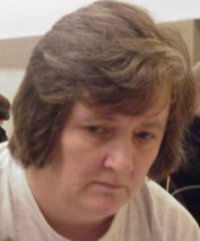Contest conducted by Marc Smith
We are a third of the way through the 2024 competition, and this month we will begin posting the leader-board in the annual competition along with the monthly winners.
There are a number of congratulations to panel members this month. At the European Winter Transnational Championships held in Alpe d’Huez, France this month, three of our panel members reached the final of the main team event. Sjoert Brink and Michal Klukowski were both members of the winning Zimmermann team, with Jacek Pszczola on the team that claimed silver medals. Ola Rimstedt was a member of the winning Orca team in the subsidiary BAM Teams event.

Closer to home, Alan Mould (left) was a member of the winning team in this month’s final trial to select the England Seniors team for the upcoming European Championships. Alan and his partner, John Holland, were members of the England team that won silver medals in the 2019 World Seniors Teams in Wuhan, so let’s hope they can go one better in Denmark. Also on the home front, Sally Brock and Nevena Senior were both members of the winning England team at the 2024 Lady Milne Trophy, the annual contest between ladies teams representing the countries of the British Isles, England, Scotland, Ireland, Northern Ireland and Wales. They will also be looking to bring medals home from Denmark later this summer.
This month’s guest panelist led all entrants in the February competition with an impressive 79/80. Rik Suyver is a 75-year old retired lawyer from Netherlands. He learned the game from his father in the 1960s, and he is a regular at the HOK Bridge Club in Amsterdam. “My adage,” says Rik, “is that bridge is a difficult game.”
We are delighted to welcome a new regular member to our expert panel. One of the most recognizable names in world bridge, Nick Nickell reached the final of the Grand National Teams in 1983 and he won his first National event in 1991, the Kaplan Blue Ribbon Pairs partnering Bob Hamman. He has now won 25 US National titles (with 16 second-place finishes), including the Spingold 9 times, the Reisinger BAM Teams 8 times, and the Vanderbilt 5 times, most recently in Louisville just a few weeks ago. Representing the USA, Nick won the Bermuda Bowl at his first attempt, in Beijing in 1995. He has since won three more times (2000,2003 and 2009) and picked up two silver medals and one bronze from the game’s most prestigious event. Most recently, he won the Rosenblum Cup at the 2022 World Championships in Wroclaw. It was the second time that he had reached the final of that event. Welcome, Nick.
A couple of people have contributed hands this month: panelist Marty Bergen (#3 and #7) and regular competitor Tom Jacob (#4). Thanks to both of them. If you have a hand that you think would produce an interesting panel discussion, please send me details. Remember that the best problems offer three or more sensible actions rather than being a straight choice between two.
The panel produces a majority on six of the eight hands this month, although they also offered at least five different choices on five of them. Does that mean it should be a high-scoring set for the competitors? Perhaps, as the most popular action chosen by competition entrants scores ‘10’ on five of the eight hands. Voting with the largest group of competitors this month would score a very respectable 64/80 (up from 45/80 in March), although the average score is 46.46 (down from 48.09 on Set 24-03). Let’s see what the panel have to say about this month’s hands…

|
ACTION |
MARKS |
PANEL |
Competitors' |
|
4♥ |
10 |
10 |
7 |
|
5♠ |
7 |
5 |
3 |
|
3NT |
7 |
1 |
3 |
|
4♦ |
7 |
1 |
4 |
|
4NT |
6 |
4 |
11 |
|
6♠ |
6 |
0 |
2 |
|
4♠ |
4 |
2 |
52 |
|
3♠ |
0 |
0 |
15 |
|
Pass |
0 |
0 |
2 |
|
4♣ |
0 |
0 |
1 |
Competition Entrant Average Score: 4.26
Why is this the lowest-scoring hand of the month? More than half of competition entrants simply jumped to game, and the second-largest group even settled for a non-forcing 3♠. By contrast, the panel voted 21-2 in favour of making a slam try. The only question for them, was how to do so, and the largest group chose a return cue-bid of 4♥.
BERGEN: 4♥. The least misleading slam try.
WANG: 4♥. A slam try with nothing in hearts.
MARSTON: 4♥. Showing slam interest without a minor-suit control
VILLAS-BOAS: 4♥. This should show slam interest without a control in either minor.
HUNG: 4♥. I have a great hand opposite the splinter, but I can’t RKCB in case partner has some 4162 or 4153 without a club control.
MEYERS: 4♥. My hand just seems too good to bid a "measly" 4♠. I think I have to make a try, so I will bid 4♥. I am denying a control in either minor so, hopefully, partner will ask for key cards holding something like Jxxx/x/AKQxx/Axxx.
Sjoert reluctantly joins the largest faction, but is clearly in a little world of his own 😊
BRINK: 4♥. The book bid, but I really want to bid 6♦. It is losing bridge to tell everyone that I have a good hand with no minor-suit cue-bid. Yes, smart, but not great. Ai ai ai, I have become an old man, following rules.... I respect everyone who bids 6♦, and I hope I will be that young soon...
COPE: 4♥. The description of 3♥ as only being 3+♠ is mildly confusing, and the range of the splinter is not specified. Despite this confusion we are definitely worth a slam try, which we can do by bidding 4♥, denying any minor-suit control, and making partner captain of the hand.
(The main reason for describing the splinter that way was to make it clear that 3♠ would be non-forcing. As for range, it presumably shows anything from a minimum high-card raise to 3♠ upwards.)
MOULD: 4♥. Given this hand is in, I assume we have a perfecto slam opposite something like xxxx/x/AKQxx/Axx. However, without methods I cannot see what I am supposed to do, and this hand highlights the importance of agreements here (3NT as a slam try or 4♣ as a general try or something). If 3♥ was game-forcing, I would obviously bid 3♠ but it ain’t. I am not psyching a 4m cue, so I will psyche 4♥ instead! If partner Blackwoods, at least they will know the right number of keycards. I don’t expect to score many points for this, but I cannot see anything more attractive.
Nor can anyone else, Alan, so you can have 10 marks for your reluctant choice.
S BALDYSZ: 4♥. I usually play that raising of a splinter shows nothing wasted in that suit (although I know that some people play that 4♥ here would show the ace). I have a decent hand, although no side cue-bid. Partner could be 4-1-4-4 or 4-1-5-3 plus some shapes with a void heart too, so I definitely want to investigate slam. My alternative would be 5♠ saying, "I have good trumps, but no side cue-bids", but I’m not sure if that's what it means in Standard.
That is certainly what the handful of panel members who bid 5♠ think it means.
McGOWAN: 5♠. I think this says “I have the trumps – do you have the controls?”
BIRD: 5♠. All I have to offer is my wonderful spades. A jump to 5♠ passes this message.
RONDON: 5♠. 4♠ seems too little, so let's go to 5♠. Looking at his hand, partner should understand that I'm showing good spades rather than asking for them.
ROBSON: 5♠. I think this is a quantitative bid implying solid spades and little outside (given our lack of control bid).
C BALDYSZ: 5♠. I play this as a reverse trump asking slam invite, meaning I have no cue-bids but excellent trumps.
There were also a couple of innovative solo suggestions that achieve the same objective…
This seems like a good idea perhaps…
NICKELL: 4♦. I have a great hand for partner. I want to find out if he can show me a void in hearts.
Although I wonder if you will know for certain, as would he not also bid 4♥ with a singleton ace?

This was my choice when I first saw the problem, and I expected more support for it.
LARSSON: 3NT. I can consider continuing with 4♥ over partner’s 4♣.
P.O. wondered about it but then headed in another direction…
SUNDELIN: 4NT. Probably I am alone in thinking that 3NT here should show good trumps.
Perhaps it is an exclusively Swedish idea.
SHENKIN: 4NT. I will bid slam if we are missing only one key card.
Yes, you would be unlucky to find partner with Jxxx/A/AKQxx/QJx, although I suppose it is possible.
COHEN: 4NT. Don't show this to my students, as I tell them not to use Blackwood with an uncontrolled suit, but how can partner have a 3♥ bid without a high club? (See above. MS.) I toyed with some sort of control-less "control-bid" but, instead, I'll just take control. I couldn't resist using "control" three ways in the same sentence 😊.
BROCK: 4NT. My first thought was to bid 4♥, Last Train, but on second thoughts I don’t think that is enough.
Sally considers 4♥ is not enough, so what would she think of this conservative duo…
SUYVER: 4♠. Partner is likely to have 4-1-5-3 shape. For slam, we would need to play both diamonds and clubs without losers.
And Joey even considered bidding only 3♠!
SILVER: 4♠. At match points I might have bid only 3♠ but, at IMPs, even considering the vulnerability, this hand is worth a game try.
Partner had xxxx/A/AKxx/AKxx, so it looks like everyone except the 4♠ bidders will get to the excellent 6♠.

|
ACTION |
MARKS |
PANEL |
Competitors' |
|
Dbl |
10 |
15 |
36 |
|
5NT |
7 |
3 |
2 |
|
4NT |
7 |
3 |
8 |
|
5♣ |
5 |
1 |
3 |
|
6♦ |
5 |
1 |
8 |
|
5♦ |
5 |
0 |
34 |
|
5♥ |
4 |
0 |
2 |
|
6♣ |
2 |
0 |
1 |
|
4♠ |
0 |
0 |
4 |
|
Pass |
0 |
0 |
2 |
Competition Entrant Average Score: 6.65
Typical - you have a good hand but the bidding is already at the four-level before you get a chance to speak. Although the panel came up with five alternatives on this one, there was a big majority vote in favour of a double. Curiously, the contestants were split almost evenly between double and an action (5♦) that did not receive any support from the panel. As that choice seems to be of similar merit to the two panel choices that also just chose a contract, so I awarded it the same mark. Let’s start with the majority…
ROBSON: Dbl. Good hand / take-out. Anything else is a stab in the dark.
BERGEN: Dbl. I am definitely hoping that partner can find a bid.
COHEN: Dbl. My dream partners take this out -- and then I will have to decide if I am content. But I am not willing on my own to choose a strain.
MARSTON: Dbl. Not a penalty double. I expect partner to pull with a second suit.
SILVER: Dbl. In this day and age, surely even in the mother country, this double is not pure penalty. The villains have put us in a very difficult situation. I am expecting partner to bid with extra distribution and, if not, our side will take our punishment in 8♥!
RONDON: Dbl. We've got more strength than the bidding so far should allow us to have, but not enough to force to slam. If partner decides to pass, we might get +500 or more defending.
VILLAS-BOAS: Dbl. I still don’t know in which suit or at what level I will play.
Some were concerned about missing a spade fit…
BIRD: Dbl. Not much of a problem, on the face of it. If you bid 5♦ immediately, you might miss a 4-4 spade fit.

McGOWAN: Dbl. I hate to do this to partner, but she might still have four spades. Opponents are bidding on fresh air, so I guess partner is also short in hearts. Slam may fail on bad breaks…
C BALDYSZ/SHENKIN/NICKELL: Dbl.
S BALDYSZ: Dbl. A number of contracts could be right. If partner has A-K-K in the black suits, slam would have a good chance of making. However, with the ♥K and KQJxxx in clubs, we might be in trouble at the five-level.
Alan earns ‘Comment of the Month’ honours for this effort, despite the inaccurate prediction.
MOULD: Dbl. What a problem!! No idea. I will double as a transfer... Transfer the problem to partner. I don’t expect many points for this either.
Jill alludes to one of the alternatives.
MEYERS: Dbl. Ugh! I play 4NT here is a good 5♣ bid, and I don’t think this hand is quite that. I am going to Double (responsive), and then decide what to do after partner bids.
So, is 4NT a slam try in clubs or offering a choice of minors? Sjoert doesn’t tell us…
BRINK: 4NT. I have one rule: Let the opponents make the last guess instead of you doing it.
…Tim agrees with Jill’s view…
COPE: 4NT. Not keycard - just a slam try in clubs. I want to make sure we go plus on the hand, and since the bidding suggests bad breaks, it would be unilateral to bid more. Even if partner has three-card diamond support, we may still be off two aces. I cannot afford to double for takeout, as I suspect that partner will leave it in, and we may only have four tricks in defense - a scant reward for a vulnerable game.
… whilst Jessica clearly thinks it shows both minors…
LARSSON: 4NT. I will pass if partner bids 5♣, and raise 5♦ to 6♦.
Readers might check to see what their regular partner would make of 4NT in this auction. There is no doubt about the meaning of…
WANG: 5NT. Pick a contract.
BROCK: 5NT. I expect a decent hand for a red two-level overcall. Hopefully 5NT asks him to choose between minor-suit slams.
HUNG: 5NT. Pick a slam. Will partner be courageous enough to bid 6♦ with 3-1-3-6 shape? Let’s hope so.
Only a couple of panelists were prepared to commit themselves, and they chose contracts at opposite ends of the spectrum…
SUYVER: 5♣. Partner has long clubs and not too many points. It is too risky to ask with RKC: if the answer is 5♥ we are too high.
SUNDELIN: 6♦.
Partner had xx/Kx/xxx/AKJxxx so 6♦ is good and 6♣/6NT playable. 4♥-X probably gets +500 and 5m either +600 or +620. P.O. is the only one to scoop all the marbles for sure.

|
ACTION |
MARKS |
PANEL |
Competitors' |
|
3♠ |
10 |
12 |
46 |
|
Pass |
8 |
10 |
28 |
|
3NT |
4 |
1 |
7 |
|
Dbl |
2 |
0 |
17 |
|
4♦ |
0 |
0 |
1 |
|
4♠ |
0 |
0 |
1 |
Competition Entrant Average Score: 7.02
The panel is divided on the question of whether to bid or not, with a small majority in favour of taking action. With competitors largely split along similar lines, this is the month’s highest-scoring hand, even though more than a quarter opted for something other than one of the panel’s popular options. There were a couple of complaints from the panel about our original double, although most accepted that the hand was too strong for a protective 1♠ overcall…
BERGEN: Pass. I submitted this one. I thought it was a good problem.
Although Nick disagrees.
NICKELL: Pass. This is a pure guess.
A number of panelists opted for discretion over valor…
MEYERS: Pass. I don't think I am making anything and we have a shot to beat 3♥.
I certainly cannot argue with Hanoi’s assessment of the problem.
RONDON: Pass. Better them going down than us.
MARSTON: Pass. I wish I had bid 1♠ last time.
COPE: Pass. An esoteric 3NT may work better when partner has the right cards, but the likelihood of finding him with a good spade card, the ♦Q and something to solidify the clubs is asking too much.
WANG/SHENKIN: Pass.
Sophia is philosophical but practical…
S BALDYSZ: Pass. Yuck! It doesn't seem likely that we're making anything, although North could have 7-4 in the round suits or something like that with fewer points. I have the worst possible heart holding and I would need something like AKx/x/Qxxxx/xxxx from partner to make 4♠ opposite this hand. The worst case scenario is that partner has a weak 1-3-5-4 and anything we bid at this level will go a lot down. With declarer having to play mostly out of hand I have four likely tricks and the possibility of a fifth. Sometimes we'll miss a spade game, but such things happen.

Joey eloquently sums up the case for the passers.
SILVER: Pass. An original takeout double here does not make much sense, as it wrong sides the contract. I missed my chance at the one-level to overcall spades, and I have no intention of compounding that error by bidding at the three-level with a hand which is not nearly as good as it looks.
The rest all choose to take action, with varying degrees of enthusiasm.
SUNDELIN: 3♠. This could be very wrong.
LARSSON: 3♠. I need to keep fighting, I think.
BRINK: 3♠. Not bidding 1♠ on the first round is ridiculous.
Why don’t you tell us what you really think, Sjoert 😊
BIRD: 3♠. Whether or not this will work well, I am forced to bid my spades now after failing to bid 1♠ before.
ROBSON: 3♠ Following through with our original plan to double and bid spades.
VILLAS-BOAS: 3♠. Natural.
C BALDYSZ: 3♠.
Liz is the eternal optimist.
McGOWAN: 3♠. Assuming North has not lost his marbles I cannot be sure of five tricks in defence and, if 3♥ is failing, 3♠ may make.
SUYVER: 3♠. Showing 5+ spades and 17+ points. Yes, I have bad points in hearts, but it’s still worth a try.
BROCK: 3♠. It could be right to bid 3NT, but I think 3♠ is likely to restrict the damage if I’m going down.
Alan doesn’t seem to even consider passing an option…
MOULD: 3♠. This seems to be a guess between 3♠ and 3NT. If we have a game, it seems to me more likely to be in spades, but I could easily be wrong.
A number of panelists mentioned 3NT, but Andy was the lone brave soul to choose everyone’s favourite contract.
HUNG: 3NT. Who knows? Anything could be right (even pass).
Partner had xx/xxx/10xx/AJ108x so you do best to defend. Theoretically, you want to double and defend but, if you double again, partner is all too likely to bid 4♣. The passers can claim the moral high ground on this occasion.

|
ACTION |
MARKS |
PANEL |
Competitors' |
|
2♠ |
10 |
15 |
34 |
|
3♠ |
6 |
4 |
30 |
|
Pass |
6 |
4 |
8 |
|
3NT |
0 |
0 |
12 |
|
4♠ |
0 |
0 |
6 |
|
2NT |
0 |
0 |
5 |
|
3♦ |
0 |
0 |
3 |
|
3♣ |
0 |
0 |
1 |
Competition Entrant Average Score: 5.68
A fairly large majority vote from the panel, with two minority choices at each end of the scale garnering a modicum of support. The most popular choice of contestants (just over a third) agrees with the panel’s choice, although a large faction also supports the 3♠ overbid.
BROCK: 2♠. A bit of a guess.
BRINK: 2♠. I guess this is best.
SILVER: 2♠. Showing my age by playing for a plus score by going low.
NICKELL: 2♠. This feels like an underbid, but it also feels like a misfit, so caution is warranted.
A number of panelists make the point that, with a minimum hand, they would have bid 2♠ on the previous round.
MEYERS: 2♠. I play that this auction shows a good 6-4 hand. If I had a weak 6-4, I would bid 2♠ over 1NT and, if partner then bid 2NT, I would bid a non-forcing 3♣.
COPE: 2♠. I am not yet giving up on game, and partner should realize that this will be a mild game try as, with a weaker hand, I would have just bid 2♠ over 1NT.
ROBSON: 2♠. This implies extras with 6-4, otherwise we’d either have rebid 2♠ not 2♣, or passed 2♥. Facing partner’s presumed weak hand with six hearts, we don’t want to get too excited.
WANG: 2♠. This shows 6-4 and 14-17 HCP.
RONDON: 2♠. Showing extra values and describing our distribution.
C BALDYSZ: 2♠.
SHENKIN: 2♠.
BERGEN: 2♠. I believe that West's auction definitely suggests extra values. It is certainly true that East's auction strongly suggests that his hand will NOT fit with mine.

Larry sums up the problem as the majority saw it.
COHEN: 2♠. Bidding 2♣, I can hear Al Roth saying: "If I get a chance to make a third call..." -- Now I have the chance, and I will show my good 6-4. I see it is vulnerable at IMPs, but am I really supposed to overdo it with 3♠ and buy something like --/KQ10xxx/Jxxx/xxx?
P-O and David each allude to one of the alternatives…
SUNDELIN: 2♠. This could also be wrong, as passing 2♥ could be the winning choice.
BIRD: 2♠. This hand is not quite worth 3♠, without the ♠10. Partner will realize that I would have rebid 2♠ on the second round with a weaker 6-4 shape.
There was a small faction for the conservative action…
SUYVER: Pass. Disciplined.
McGOWAN: Pass. Always trust partner! I have tricks in the side suits, so even a 5-1 fit may have chances.
MARSTON: Pass. I hope partner's hearts are better than my spades.
MOULD: Pass. Again, partially dependent on methods. If partner had some invitational 3♥ bid available at some point, then Pass is much more comfortable. Here we have a vulnerable game on the line, which could be good but, apart from anything else, I don’t have an attractive continuation. Is 3♥ really this hand? 3♦? 2NT is nuts IMHO. Again, I don’t expect many marks.
…whilst a similar number chose the aggressive approach.
VILLAS-BOAS: 3♠. A good 6-4 hand.
LARSSON: 3♠. Pushy. Hopefully, the ♠9 will be useful.
HUNG: 3♠. This should describe my hand pretty well. (2♠ would be more of a minimum). I might have had better spades, but we can’t have everything.
S BALDYSZ: 3♠. I wouldn't have minded if I had 2♣ as Gazilli in my arsenal. Would a direct 3♥ bid be weak or invitational over 1♠? (Strong. MS.) I suppose I could still be bidding 2♠ with a weak 5-0-3-5. I would like to bid 2.5♠ but, as I don't have that in my bidding box, I'll lean towards 3♠. I pretty much need the ♥A and ♠K from partner and no very bad splits in the side suits to make game.
At the table, East had ---/AKxxx/Kxxx/xxxx, so 2♠ is the most successful choice, as partner will then get you to 3♣. 2NT probably gets raised to 3NT, which looks likely to be one too high. Should partner have bid 3♣ rather than 2♥? Presumably not, as you have only promised three clubs playing a forcing 1NT response.

|
ACTION |
MARKS |
PANEL |
Competitors' |
|
6♥ |
10 |
13 |
30 |
|
3♥ |
7 |
4 |
12 |
|
3♣ |
6 |
2 |
16 |
|
4NT |
6 |
1 |
6 |
|
5♣ |
6 |
2 |
5 |
|
6♠ |
5 |
0 |
2 |
|
7♥ |
5 |
0 |
2 |
|
4♥ |
3 |
1 |
17 |
|
4♣ |
0 |
0 |
5 |
|
Pass |
0 |
0 |
1 |
|
4♠ |
0 |
0 |
1 |
|
5♥ |
0 |
0 |
1 |
|
5NT |
0 |
0 |
1 |
Competition Entrant Average Score: 6.17
Although the panel offered six choices, there was a clear majority for pragmatism, and nearly a third of competition entrants agreed. All but one panelist headed for slam, but more than 1-in-7 competitors was willing to settle for game.
The other question was whether you were willing to risk playing a likely slam hand in a partscore. Perhaps there is a good case for 3♥ to be forcing but, although partner is an expert, would you take the chance without specific agreement? A handful of panelists were sufficiently convinced…
MOULD: 3♥. At last, an easy one. It is just possible I may bid again...
As long as dummy doesn’t appear 😊.
BROCK: 3♥. I have no doubt that this is forcing. It would be good to know if he has five spades. 6♥ sounds about right for next time, but we could easily miss seven.
COPE: 3♥. This is 100% forcing as partner has made a free bid, and we have changed suit to show a strong hand. I hope that the extra room that this bid gives us will enable us to investigate the hand better.
LARSSON: 3♥. Not that I am particularly confident about what to do next, but maybe I will get wiser.
Most were not willing to take the chance…
BRINK: 6♥. Let's go.
WANG: 6♥. To play.
MARSTON: 6♥. Looks like a good bet.
RONDON: 6♥. It's hard to be scientific with an eight-card suit and a partner who chose one of the suits I should have. I hope I don't miss seven.
BIRD: 6♥. There is no point seeking assistance from partner, when so little is needed for a slam. The ♠K or ♦K might be enough.
S BALDYSZ: 6♥. Lovely! Long heart suits seem to be popular in this set. We could be making anything between game and a grand here, but it would be difficult to find out about K-K-Q in the sharp suits in partner’s hand. Even then, hearts might break 4-1 or 4-0. True, I might go down in slam, but they also might not find that only killing lead if there is one.
A number of panelists highlight the danger of trying to investigate more deeply.
MEYERS: 6♥. Not very scientific but, if partner has the ♠K-Q-x-x and out (and hearts split), I am making this. It may be difficult to untangle into hearts if I don't just blast it now.
SUNDELIN: 6♥. I take my shot now, as RKCB and later 6♥ might be difficult for partner to understand with a singleton or void in hearts.
ROBSON: 6♥. An underbid. I really want to bid 4/5NT to find out if partner has the ♠K-Q, but will partner then leave me in hearts? 7♠ will be tricky if partner has something like KQxx/xx/xxxx/xxx on a club lead, he will need either the ♠9 or a 3-3 split. So, let’s chicken out. Maybe partner didn’t bid at the other table, and slam was missed altogether.
Marty succinctly sums up the danger.
BERGEN: 6♥. If partner has the ♠K-Q, I'd like to be in 7♥. What I certainly don’t want is to be in 7♠ on a club lead if partner has only four spades without the nine.
Rik points out another advantage of going directly to slam.
SUYVER: 6♥. If I bid 3♣ or 5♣ (Excl. Blackwood), the opponents will surely lead diamonds. Now I hope they will start with the ♣A. If partner has both king and queen of spades, we’ll miss seven, but I can’t find out safely and be sure of being able to play in hearts.

Joey and Liz would both have preferred to start from elsewhere…
SILVER: 6♥. Personally, I would have taken a chance (Columbus did, and look what happened to him) and overcalled 1♥. So, in his sprit, I'll take a chance here.
However, Liz is alone in taking a pessimistic view of the hand.
McGOWAN: 4♥. Nothing good ever comes of doubling on a hand like this! I am not sure that 3♥ is forcing so, although slam may be on, I am settling for a plus score (I know what I might bid 2♠ on here). 3♣ will achieve nothing and 4♣ would agree spades.
The rest were willing to agree spades temporarily in the quest to find out if partner had the material for a grand slam.
HUNG: 3♣. Maybe we could start with a natural and forcing 3♥, but I am not 100% sure partner will bid again. It should be forcing, but he might chance a pass with something like Kxxxx/x/Jxxx/xxx, thinking he has already pushed the boat out and now he is trying for a plus score. So, let’s start with 3♣, which is clearly forcing. Chances are I will be jumping to 6♥ at some point (unless I can find out enough information to bid 7♥).
C BALDYSZ: 3♣. I'd like to bid 5♣ to find out about the ♠K-Q, but I'm afraid I won't then have a way to stop in hearts.
A couple were willing to take the chance, although Larry is clearly aware of the danger.
COHEN: 5♣. Exclusion RKCB. I am hoping for one spade key card and then, after my queen ask, I just have to hope partner gets the message when I try to play in hearts.
VILLAS-BOAS: 5♣. Exclusion. This seems like the best way to find out about the spade suit, and then I will bid 6♥/7♥.
Barnet finds another route to find out what he needs to know.
SHENKIN: 4NT. If he has one key card, I will gamble that it is the ♠K and then ask for queen. I could bid exclusion 5♣, but that might get messy after 5♥-5NT if you respond first is worst for queen. This assumes that the first step to exclusion is 0 not 1. If it was 1, then 5♦ showing one, 5♥ ask, 6♠ showing ♠K-Q, then 7♥ works. Note, answer depends on exclusion response, but I will always play in hearts.
This month’s competition winner and one of the leaders on the new annual competition leader-board, Paul Dubois from California, had to answer this problem at the table during a recent coaching session. He will be pleased to see that the panel agree with the 6♥ bid he made first time around. Partner had Qxxxx/---/Kxxxx/Qxx. Hearts were 4-1, but the ♠K was onside, so 6♥ was an easy make. A club lead combined with 4-1 breaks in both majors renders slam in spades unmakeable.

|
ACTION |
MARKS |
PANEL |
Competitors' |
|
Dbl |
10 |
21 |
30 |
|
4♣ |
6 |
1 |
27 |
|
4♠ |
5 |
1 |
5 |
|
3NT |
3 |
0 |
13 |
|
Pass |
2 |
0 |
12 |
|
3♠ |
2 |
0 |
12 |
Competition Entrant Average Score: 5.74
In 40 months and 320 deals, this is the closest we have come to the dreaded unanimous panel, so I am grateful to Rik and Jessica for saving us on that score. There is much less consensus amongst the competitors, with just under a third picking up top marks. Although perhaps double looks like the obvious choice, and will probably land us in the best game, is it ever going to get us to 6♣ in a 6-3 fit if that is where we belong. I thought more would agree with Rik and the second-largest group of competition entrants…
SUYVER: 4♣. 3♠ is too little, 4♠ too much, and 3NT too risky. I’ll bid my suit and maybe partner can raise.
I think a number of the doublers were willing to get to 4♠ eventually, so I’m not so sure that Jessica’s unilateral decision is an improvement.
LARSSON: 4♠. This is very much a question of partnership style. For many of my regular partners, I do not like to punish them for a simple 1♠ overcall, but I will still overbid this hand.
The rest thought it was clear, with varying degrees of optimism.
BERGEN: Dbl. Flexible, economical, but very imperfect.
MOULD: Dbl. I cannot see anything more attractive.
BIRD: Dbl. This is even less of a problem than Hand 2. The scores should be high this month.
WANG: Dbl. Just showing points.
MARSTON: Dbl. Partner should pull with shape.

Joey asks for something that we all hope will happen to us.
SILVER: Dbl. The ubiquitous double strikes again, telling partner to do something intelligent (if he is capable of it).
Some double as an alternative to passing…
BRINK: Dbl. Too much to pass, so doubling is the best I can do.
COHEN: Dbl. I can't pass and this is my best guess. Shades of Hand 2.
McGOWAN: Dbl. I cannot bring myself to pass, although that might easily be best… Double should be a game try, so it at least gives us a shot at stopping at the three-level.
MEYERS: Dbl. Responsive and, VOILA, if partner can bid 3NT. Otherwise, I think we will be in 4♠. Partner has two hearts at most and I have too much to pass, so I feel I have to double.
ROBSON: Dbl. Passing is too supine for me, although it may easily be best. Double may not work well eg if partner bids 4♦, but quelle choix?
Some just think it is obvious…
SUNDELIN/C BALDYSZ/SHENKIN/NICKELL: Dbl.
Some optimistically hope that partner will bid their long suit…
HUNG: Dbl. I am hoping partner will bid 4♣, then we’ll be off to the races. If he bids 4♦, I’ll go back to 4♠. There is a risk that partner might pass my double with some 5-2-3-3 hand, but I’ll take that chance. Another possibility is a jump to 4♠, but that might look very silly if partner has a 5-1-3-4 shape with only a moderate spade suit, and 4♠ goes down with 5♣ or even 6♣ cold.
S BALDYSZ: Dbl. Partner has something along the lines of 5431, 5422 or 5332 or some hands with six spades. If partner could bid a Michaels 2♥ with any strength, we could at least exclude some possible hands. A number of contracts could be right here, starting with setting them in 3♥ when we cannot make anything. Most likely we will end in game in a black suit. If partner bids 4♦, I can bid 4♠ but, if he bids clubs, then bingo!
COPE: Dbl. Looks like the right values to play 4♠ when partner has six of them, and a double keeps other options more flexible.
RONDON: Dbl. It's always a good idea to give choices to partner. By doubling, we can get to spades, diamonds, clubs or maybe even no-trump.
Or, indeed, to hearts too 😊
VILLAS-BOAS: Dbl. 3NT could be better if my partner has something like ♥Q-x, but I prefer a Double.
BROCK: Dbl. I am not quite sure whether this is cards or an invitational bid in spades. But it's hard to see an alternative. It feels unlikely that 3NT is the right contract.
At the table, partner may well have bid clubs over your double, as he had A109xxx/x/xx/AQxx. Even so, you probably want to stop in game, although getting to slam might scoop the jackpot, depending on the lead. 3NT has nine tricks. 5♣ is better, even at MPs, as it will make 11 tricks on a diamond lead, but probably 12 on a heart lead. 4♠ seems to be the best MP contract, making 620 or 650 depending on how trumps behave and whether there is a club ruff.

|
ACTION |
MARKS |
PANEL |
Competitors' |
|
2NT |
10 |
12 |
13 |
|
3♥ |
9 |
6 |
10 |
|
3♦ |
9 |
1 |
<1 |
|
5♠ |
7 |
0 |
<1 |
|
4♠ |
5 |
3 |
41 |
|
6♠ |
5 |
1 |
10 |
|
4NT |
3 |
0 |
<1 |
|
3♠ |
0 |
0 |
16 |
|
2♠ |
0 |
0 |
9 |
|
3NT |
0 |
0 |
3 |
|
4♥ |
0 |
0 |
3 |
|
Pass |
0 |
0 |
1 |
|
3♣ |
0 |
0 |
1 |
|
4♣ |
0 |
0 |
1 |
Competition Entrant Average Score: 4.75
Is this a hand on which to just bid game, or are slam possibilities worthy of investigation? 20 out of 23 members of the panel think it is worth investigating or bidding slam. By contrast, nearly half of competitors settle for game, with a further almost 1-in-5 opting for a game invitation of 3♠ and 1-in-9 even choosing a non-invitational 2♠. That is a remarkable difference is the evaluation, so let’s see if the panel can explain why they think their hand is so good…
SHENKIN: 2NT. I keep the bidding low to gain information as slam is certainly possible.
ROBSON: 2NT. Well, this is all a bit systemmy. I assume 2NT then 3♠ is forcing (while 3♦ shows the spade-invite hands). So 2NT it is, as slam is very much in the game.
RONDON: 2NT. Let's hear more from partner. Knowing the minor and possible extras that partner may hold might push us to slam instead of only game.
COHEN: 2NT. Too much to settle for only 4♠ (picture AKxxx -- xxx KJxxx). Even if we haven't discussed this, when I eventually bid 4♠, at least I can tell partner I was trying to reach slam.
WANG: 2NT. Asking.
C BALDYSZ: 2NT.
SUYVER: 2NT. Asking which minor. If he has clubs I’ll investigate further.
NICKELL: 2NT. This hand is too good to just bid 4♠. I will find out his minor and then bid strongly.
HUNG: 2NT. I potentially have a great hand, so let’s go slowly and find out more information.
A couple of panelists have agreed methods for proceeding after a Michaels bid, but they acknowledge the universal use of 2NT as forward-going in an unfamiliar partnership.
MEYERS: 2NT. Which is asking, presumably in the Major, although I like to play 3♦ is a "good" hand in support of partner’s major. If partner signs off, I am bidding 4♠, if partner bids at the four- level, I will likely navigate in the direction of slam.
MOULD: 2NT. There are a lot of hands this month that depends on methods. I do whatever I need to do to agree spades. If we have a method (3♦ or 3♥) then please put me down for that. Else I will waffle with 2NT and hope the weather keeps fine.
David sums up the case for the majority.
BIRD: 2NT. Whatever responses are being played, this can hardly be wrong. With such as ♠AKxxx and ♦KQxxxx, partner will jump to 4♦, and off we’ll go.

A couple take a different approach but with similar intentions.
BROCK: 3♦. For me, this is a forcing spade raise. That seems like a good start. If partner signs off in 3♠, I can make one more try with a 4♣ cue.
BRINK: 3♥. Slam try.
MARSTON: 3♥. Showing slam interest on the way to 4♠.
LARSSON: 3♥. There are many different possible calls, depending on your agreements, but here I will settle for 3♥, which should be at least a game try in spades.
S BALDYSZ: 3♥. Partner did bid at unfavorable. Sure, there are some hands where we can go down even at the three-level, but opposite both black suits I'm very close to making at least game. Indeed, opposite as little as AKxxx/x/x/Kxxxxx we have an easy slam, so I'll just show game-forcing values and a spade fit and see what happens.
Remember that hand!
VILLAS-BOAS: 3♥. This shows a good hand. He bid 2♥ vulnerable against not, so I cannot rule out slam at this stage.
BERGEN: 3♥. I also submitted this one. I want to be in at least 4♠, but I want to tell partner that I have values.
We do have three panelists settling for game…
COPE: 4♠. A simple bid for a simple soul - it is what my hand is worth, isn't it?
McGOWAN: 4♠. Pitiful, but I think I need another spade to go slamming via a cue-bid.
SILVER: 4♠. At match points I might have bid only 3♠ but, at IMPs, even considering the vulnerability, this hand is worth a game try.
…and one committing to slam without further ado.
SUNDELIN: 6♠.
Sophia picked the exact hand that partner held when the deal occurred, AKxxx/x/x/Kxxxxx, so 12 tricks in either black suit were easy. At the table, West bid 4♠, and East had no reason to bid again.

|
ACTION |
MARKS |
PANEL |
Competitors' |
|
4NT |
10 |
9 |
10 |
|
Pass |
8 |
6 |
26 |
|
3NT |
7 |
3 |
9 |
|
5♣ |
6 |
2 |
2 |
|
Dbl |
5 |
3 |
42 |
|
4♣ |
2 |
0 |
7 |
|
6♣ |
2 |
0 |
1 |
|
4♥ |
0 |
0 |
2 |
Competition Entrant Average Score: 6.19
I think this was by far the most difficult problem this month, and the panel came up with five choices, none of which attracted a majority vote. I don’t know how many times I have told students, “No, you cannot use Unusual Notrump with only 5-4, you must have 5-5.” And, yet, here we are, asking partner to pick a minor, and at the four-level to boot, with only 4-3 in our suits. A remarkable deal, indeed! Let’s hear what the various factions have to say in support of their choice…
McGOWAN: Pass! They got me. This might even produce a plus score.
BRINK: Pass. Let's go plus.
NICKELL: Pass. I will go quietly.
COHEN: Pass. Hopefully in tempo. If I double, partner will never stop bidding spades. Even if we have a great minor-suit game/slam, it will be hard to reach. More problems lay ahead if partner backs in with 3♠.

SUNDELIN: Pass. Okay, I surrender. I lack any clever methods to differentiate between partner´s 6-0-4-3 and 5-0-3-5 shapes with suitable points or not.
You are not alone, P-O.
Tim makes an astute observation.
COPE: Pass. If I had the ♥8 instead of the ♥7, I would bid 3NT as the heart suit might be blocked. Here's hoping partner can re-open with a double and we can get some action that isn't just 50s.
There was some support for bidding ‘The House’…
WANG: 3NT. Let’s hope South has two honors in hearts.
You may not even need that – I defy any honest defender to unravel the suit if it is AKQ108x opposite Jx, for example.
MOULD: 3NT. Three No Hacking Trumps. The chances that the heart suit will block are quite high. I have great admiration for those panelists who bid 5♣ (or even 6♣!!?!) given partner’s known void. And, maybe it is the right bid, but I am too crumbly for such actions.
At the table, it was AQJ108x opposite K-x, so they could afford to play two honour cards at trick one.
BERGEN: 3NT. A devilish problem! My first hope is that partner will bid. My second is that if 3NT ends the auction, their hearts will block, such as QJ10xxx opposite AK. But I probably am dreaming.
So, what about those who chose the most unusual of Unusual Notrump overcalls?
BIRD: 4NT. Partner is known to be void in hearts, so it is both bizarre and reasonable to ask him to choose a minor suit. When the time comes, I will make an inspired guess what to do next.
MEYERS: 4NT. OH NO, I HATE THIS! I am going to play partner for at most one heart and bid 4NT for the minors. Is that insane???
Perhaps, but you’ll have plenty of company in the asylum, Jill.
BROCK: 4NT. Pick a minor. OK. I know it sounds ridiculous, but partner is surely void in hearts. As long as he doesn’t have too many spades we should end up in a playable spot. What else can I do? If I double, he will surely bid spades and then I will be even more fixed.
I think Andrew’s question is tongue-in-cheek?
ROBSON: 4NT. A rare 4NT for minors with only seven cards in my two suits. But, trusting partner for no hearts, what can go wrong?
SHENKIN: 4NT. A most interesting problem. If partner has long spades, it is possible that we should play in spades, but how can you find out if he has 4, 5, 6, or 7? I would take a chance with 4NT. Second choice 5♣, and pay off if we belong in spades.
SUYVER: 4NT. 3NT is to play, and too risky. I can’t double with only a bare ♠A, so I’m left with 4NT, asking partner to bid a minor.
RONDON: 4NT. Let partner choose a minor.
HUNG: 4NT. Interesting. If partner has a heart void with some reasonable spades, he might have overcalled 2♠, so let’s try for one of the minor suits! Hopefully, partner is not 6-0-4-3.
C BALDYSZ: 4NT. In the worst case partner has seven spades to the jack or queen and 3-3 in the minors.
Assuming that partner would only choose diamonds with longer diamonds than clubs, I am not sure how the following can be better than 4NT…
SILVER: 5♣. Hopefully, partner will produce a Goldilocks dummy, with not too many or too few clubs, just enough to enable us to take exactly 11 tricks!
S BALDYSZ: 5♣. Evidently, partner has a heart void unless the opponents are psyching. It's likely that he has a club fit. In the worse case scenario, he has something like 5-0-5-3, but I can't really find out about that. I'm going to gamble and hope he does have a club fit, in which case I will ruff my hearts in dummy. It's true that we might not make anything and their 3♥ could be down a lot, but if their suits are splitting then 5♣ will surely be close to making.
And, finally…
LARSSON: Dbl. I start with a double and bid 4♣ over 3♠. If partner jumps to 4♠, I will bid 5NT and hope for the best.
Are you sure he will choose ♣10-x-x-x rather than ♠K-J-x-x-x-x after this start?
VILLAS-BOAS: Dbl. What a difficult hand. I double and, over 3♠ or 4♠, I’ll bid 4♣/5♣.
MARSTON: Dbl. It feels weird to double with five hearts and one spade, but I have a plan. Over 3♠, I will bid 4♣. I may lose the board, but I hope to win the post-mortem.
Hmmm! Bon voyage to everyone.
Partner had KQxxx/---/xxx/Jxxxx. With spades 4-3 and clubs 2-2, 7♣ was an easy make and 6♣ will make against most distributions. Hearts do not block, so 3NT does not make, so even getting to 5♣ for a plus score is likely to score well.
Congratulations to Jill Meyers, who leads the panel this month with an impressive 78/80. Completing the podium, with 77/80, are Andrew Robson and David Bird.

My thanks to all of our experts for the time and effort they devote to both entertaining and educating our readers.
See you all again next month.
|
Jill MEYERS |
4♥ |
Dbl |
Pass |
2♠ |
6♥ |
Dbl |
2NT |
4NT |
78 |
|
David BIRD |
5♠ |
Dbl |
3♠ |
2♠ |
6♥ |
Dbl |
2NT |
4NT |
77 |
|
Andrew ROBSON |
5♠ |
Dbl |
3♠ |
2♠ |
6♥ |
Dbl |
2NT |
4NT |
77 |
|
Hanoi RONDON |
5♠ |
Dbl |
Pass |
2♠ |
6♥ |
Dbl |
2NT |
4NT |
75 |
|
Marty BERGEN |
4♥ |
Dbl |
Pass |
2♠ |
6♥ |
Dbl |
3♥ |
3NT |
74 |
|
Sjoert BRINK |
4♥ |
4NT |
3♠ |
2♠ |
6♥ |
Dbl |
3♥ |
Pass |
74 |
|
Cathy BALDYSZ |
5♠ |
Dbl |
3♠ |
2♠ |
3♣ |
Dbl |
2NT |
4NT |
73 |
|
Nick NICKELL |
4♦ |
Dbl |
Pass |
2♠ |
6♥ |
Dbl |
2NT |
Pass |
73 |
|
Wenfei WANG |
4♥ |
5NT |
Pass |
2♠ |
6♥ |
Dbl |
2NT |
3NT |
73 |
|
Larry COHEN |
4NT |
Dbl |
3♠ |
2♠ |
5♣ |
Dbl |
2NT |
Pass |
70 |
|
Alan MOULD |
4♥ |
Dbl |
3♠ |
Pass |
3♥ |
Dbl |
2NT |
3NT |
70 |
|
Barnet SHENKIN |
4NT |
Dbl |
Pass |
2♠ |
4NT |
Dbl |
2NT |
4NT |
70 |
|
Sophia BALDYSZ |
4♥ |
Dbl |
Pass |
3♠ |
6♥ |
Dbl |
3♥ |
5♣ |
69 |
|
Sally BROCK |
4NT |
5NT |
3♠ |
2♠ |
3♥ |
Dbl |
3♦ |
4NT |
69 |
|
Paul MARSTON |
4♥ |
Dbl |
Pass |
Pass |
6♥ |
Dbl |
3♥ |
Dbl |
68 |
|
Miguel VILLAS-BOAS |
4♥ |
Dbl |
3♠ |
3♠ |
5♣ |
Dbl |
3♥ |
Dbl |
66 |
|
Tim COPE |
4♥ |
4NT |
Pass |
2♠ |
3♥ |
Dbl |
4♠ |
Pass |
65 |
|
P.O. SUNDELIN |
4NT |
6♦ |
3♠ |
2♠ |
6♥ |
Dbl |
6♠ |
Pass |
64 |
|
Andy HUNG |
4♥ |
5NT |
3NT |
3♠ |
3♣ |
Dbl |
2NT |
4NT |
63 |
|
Joey SILVER |
4♠ |
Dbl |
Pass |
2♠ |
6♥ |
Dbl |
4♠ |
5♣ |
63 |
|
Rik SUYVER |
4♠ |
5♣ |
3♠ |
Pass |
6♥ |
4♣ |
2NT |
4NT |
61 |
|
Liz McGOWAN |
5♠ |
Dbl |
3♠ |
Pass |
4♥ |
Dbl |
4♠ |
Pass |
59 |
|
Jessica LARSSON |
3NT |
4NT |
3♠ |
3♠ |
3♥ |
4♠ |
3♥ |
Dbl |
56 |
|
TOP SCORE |
4♥ |
Dbl |
3♠ |
2♠ |
6♥ |
Dbl |
2NT |
4NT |
|
|
HAND 1: |
4♥ 10 |
3NT/4♦/5♠ 7 |
4NT/6♠ 6 |
4♠ 4 |
|
|
|
HAND 2: |
Dbl 10 |
4NT/5NT 7 |
5♣/5♦/6♦ 5 |
5♥ 4 |
6♣ 2 |
|
|
HAND 3: |
3♠ 10 |
Pass 8 |
3NT 4 |
Dbl 2 |
|
|
|
HAND 4: |
2♠ 10 |
3♠/Pass 6 |
|
|
|
|
|
HAND 5: |
6♥ 10 |
3♥ 7 |
3♣/4NT/5♣ 6 |
6♠/7♥ 5 |
4♥ 3 |
|
|
HAND 6: |
Dbl 10 |
4♣ 6 |
4♠ 5 |
3NT 3 |
Pass/3♠ 2 |
|
|
HAND 7: |
2NT 10 |
3♦/3♥ 9 |
5♠ 7 |
4♠/6♠ 5 |
4NT 3 |
|
|
HAND 8: |
4NT 10 |
Pass 8 |
3NT 7 |
5♣ 6 |
Dbl 5 |
4♣/6♣ 2 |
|
HAND 1: |
4.26 |
|
HAND 2: |
6.65 |
|
HAND 3: |
7.02 |
|
HAND 4: |
5.68 |
|
HAND 5: |
6.17 |
|
HAND 6: |
5.74 |
|
HAND 7: |
4.75 |
|
HAND 8: |
6.19 |